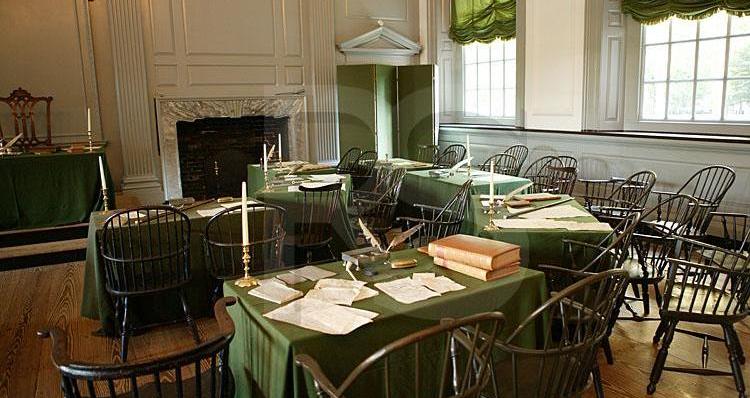In Mr. Smith Goes to Washington, the naïve Mr. Smith yields the Senate floor out of courtesy to a colleague, In doing so he loses his ability to debate on his legislation to prevent graft and corruption, Mr. Smith learned the hard way about the importance of knowing procedural rules. Officers and members of boards and and associations need to know the rules of order to achieve their goals and help their enterprises succeed. Our expertise includes:
- Meeting and Session Governance Services
- Presiding Officer Services
- Delegate Convention or Assembly Services
- Strategic Procedural Planning Services
- Bylaw Drafting, Review, and Revision Services
- Written Opinions Services
- Training Programs
Call out the sheriff! Legislators on the lamb!
Madison, WI -- Wisconsin Republican Governor Scott Walker needs to balance the budget, and he wants to do it by cutting spending and eliminating certain collective bargaining procedures of various government unions. His budget bill is being taken up by the Wisconsin State Senate where Republicans hold the majority of 19 to 14. But, fiscal bills require a quorum of three-fifths (60%) of the Senate members or 19.8 rounded to 20. Democrats have fled the state of Wisconsin to prevent a vote from being taken that they know they will lose.
The State Republican Senator Scott Fitzgerald made a motion for a call of the Senate. The motion for a call of the house in general parliamentary procedure requires, if adopted, the Sergeant at Arms lock to the doors of the assembly, after which a roll call is taken to find out who is present and more importantly who is absent without excuse. Those who are absent without excuse can be arrested and brought to the assembly. Generally, legislative bodies are the only types of assemblies that have the power to enforce a motion for a call of the the house. The Wisconsin State Senate has this authority. So now, 14 Democrat Senators are on the lamb and generally believed to be in Illinois.
The last time I can remember this happening was in Texas in 2004 when the Texas legislature was about to take a vote on the redistricting plan put together by the Republican controlled legislature. The Democrat members of the Texas legislature fled to Louisiana to prevent a quorum from being present and thereby stalling the plan from being implemented. (Needless to say, if the plan were implemented Democrats stood to lose some seats.) The Texas Rangers gathered up a posse to round up the fleeing legislators. You can't help but chuckle at the thought of a posse of Texas Rangers on horses chasing down those delinquent legislators!
The mere fact that a motion for a call of the house exists says something about us humans and the lengths that we're willing to go to have our way. Back at our nation's founding, one of the charges against King George in the Declaration of Independence was that "HE has called together Legislative Bodies at Places unusual, uncomfortable, and distant from the Depository of their public Records, for the sole Purpose of fatiguing them into Compliance with his Measures." Of course this was considered unfair. I wonder what the founders would say of the actions of either of the Wisconsin Democrats or the Texas Democrats?

© 2011 - 2016 Call To Order Parlimentarian Services
In the News
Independence Hall, Philadelphia,PA is where the Second Continental Congress debated and passed the Declaration of Independence, and where the Constitutional Convention debated and adoped the U.S. Constitution.

| Join Our Mailing List |
In Mr. Smith Goes to Washington, the naïve Mr. Smith yields the Senate floor out of courtesy to a colleague, In doing so he loses his ability to debate on his legislation to prevent graft and corruption, Mr. Smith learned the hard way about the importance of knowing procedural rules. Officers and members of boards and and associations need to know the rules of order to achieve their goals and help their enterprises succeed. Our expertise includes:
- Meeting and Session Governance Services
- Presiding Officer Services
- Delegate Convention or Assembly Services
- Strategic Procedural Planning Services
- Bylaw Drafting, Review, and Revision Services
- Written Opinions Services
- Training Programs
Senate changes cloture rule without changing the Rules.
The article, U.S. Senate Filibuster Rule Averts the Nuclear Option, describes a process for changing the Senate rules regarding the filibuster found in the Wall Street Journal. The story played itself out a bit later that year in November of 2013.
As background, in 2013 the Democrats had a majority in the Senate but that majority was less than the votes required to adopt a cloture motion or more colloquially, to stop a filibuster. The issue came to a head over the lack of progress in confirming judicial nominees. Hence discussions of a "nuclear" option to bust open the log jamb.
Rule XXII establishes the cloture motion which if adopted by the three-fifths vote closes debate after a set period of time and proceeds to a vote on the nomination or whatever other vote might be at issue. Without the three-fifths vote debate on a nomination cannot end. This would be a filibuster.
Under normal circumstances a resolution to alter the Rules of the Senate requires a majority vote but such a motion remains subject to a cloture motion and actually requires a two-thirds vote to be adopted. As noted, the Democrats did not even have the 60 votes to close debate on the judicial nomination let alone the 67 votes needed to close debate on a rules change. So here’s what they did.
When the President pro tem ruled that a cloture motion failed to close debate on the nomination of Patricia Ann Millett for U.S. Circuit Court Judge for the DC Circuit, Senator Harry Reid raised a point of order that the cloture motion required a three-fifths vote only on Supreme Court nominees, but a majority vote for all others.
The chair ruled against the point of order, but Senator Reid appealed the ruling of the chair. An appeal only requires a majority vote and, in this case, was not subject to the cloture motion requirements. So, with a majority vote of the Democrat-controlled Senate the ruling of the chair was overturned, and this changed the vote for cloture from three-fifths to a majority on all nominations except Supreme Court nominees.
The Rules of the Senate remained unchanged, but by precedent the cloture motion vote on certain nominees was changed without having to get 67 votes to close debate. Many to this day disparage the practice because it clearly violated the Rules of the Senate.

In the News
Independence Hall, Philadelphia,PA is where the Second Continental Congress debated and passed the Declaration of Independence, and where the Constitutional Convention debated and adoped the U.S. Constitution.
